America's Answer To The BMW M3
The Trans-Am series of the late 1960s and early 1970s could be considered the golden era of American motorsports. Not only did it showcase the most desirable American cars of the time, but it featured some of the world's greatest racing drivers engaging in this country's own brand of fender-banging racing.
It's why Ford is so proud of the Boss 302, winner of the 1970 Trans-Am season with legendary driver Parnelli Jones behind the wheel, and why the street car has become a legend. But ask Jim Farley, Ford's head honcho of marketing, about the 2012 Mustang Boss 302, and he'll tell you that it's not just about building a remake of the original. "This is not a nostalgia project," he told us. "This is not in any way trying to bring back the Boss. This project is so much more than that. If we wanted to do that we could take a 5.0-liter, put some stripes and spoilers and other upgrades on it and that would be it. It was not a means to an end. The Boss 302 was originally a means to an end. It was a production car to go racing. This is a completely different project. We were not going to do this project unless we could beat an M3 at this track." This track being the famed Mazda Raceway Laguna Seca.
With Bavaria's best sportscar in it sights, did Ford achieve its goal of building a modern day legend, or is the 2012 Boss 302 simply another one of the infinite variations of the Ford Mustang? Ford invited us out to Monterey for a full day with the car, including some track time at Laguna Seca, and we have the answer.
Continue reading First Drive: 2012 Ford Mustang Boss 302...
2012 Ford Mustang Boss 302 - Click above for high-res image gallery
The Trans-Am series of the late 1960s and early 1970s could be considered the golden era of American motorsports. Not only did it showcase the most desirable American cars of the time, but it featured some of the world's greatest racing drivers engaging in this country's own brand of fender-banging racing.
It's why Ford is so proud of the Boss 302, winner of the 1970 Trans-Am season with legendary driver Parnelli Jones behind the wheel, and why the street car has become a legend. But ask Jim Farley, Ford's head honcho of marketing, about the 2012 Mustang Boss 302, and he'll tell you that it's not just about building a remake of the original. "This is not a nostalgia project," he told us. "This is not in any way trying to bring back the Boss. This project is so much more than that. If we wanted to do that we could take a 5.0-liter, put some stripes and spoilers and other upgrades on it and that would be it. It was not a means to an end. The Boss 302 was originally a means to an end. It was a production car to go racing. This is a completely different project. We were not going to do this project unless we could beat an M3 at this track." This track being the famed Mazda Raceway Laguna Seca.
With Bavaria's best sportscar in it sights, did Ford achieve its goal of building a modern day legend, or is the 2012 Boss 302 simply another one of the infinite variations of the Ford Mustang? Ford invited us out to Monterey for a full day with the car, including some track time at Laguna Seca, and we have the answer.
Continue reading First Drive: 2012 Ford Mustang Boss 302...
Photos copyright ©2011 Drew Phillips / AOL
While Mr. Farley might not call the new Boss 302 nostalgic, it certainly looks the part. The exterior design takes distinct styling elements from the 1969 Boss 302, including the signature C-stripe graphics on the side of the car, black hood, a more aggressively designed front fascia, a grille with blocked off fog light openings and a subtle spoiler at the rear.
Five colors are being offered for 2012: Performance White, Kona Blue, Yellow Blaze, Race Red and the Competition Orange you see here. White graphics are standard on the Kona Blue and optional for Race Red, but the pairing doesn't seem to work as well visually as the other combinations because of the black wheels. Surprisingly, we thought the car looked its best in the most subtle of the colors, Performance White.
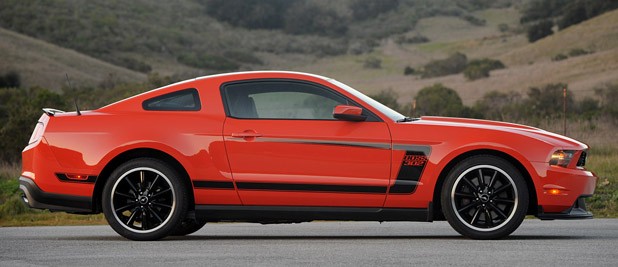
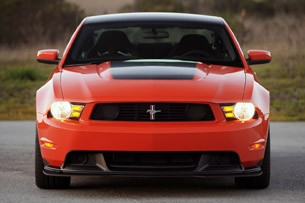
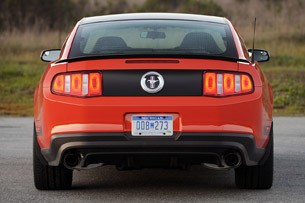
Head inside to the cockpit and you'll see what mostly appears to be a base Mustang with a few track-themed items thrown in for good measure. Those hoping for a navigation system or SYNC need not apply, as they aren't even available as options. What you will get, however, are an Alcantara-covered steering wheel, "Powered by Ford" sill plates, black gauges with a 180-mph speedo and 9,000 rpm tachometer, and a retro cue ball shifter.
Our Boss 302 was also equipped with the optional Recaro seats. The package costs an additional $1,995, and while that sounds like a lot, it also includes the Torsen differential. Truthfully, you'd have to be insane to order the car without them. Not only do the seats look fantastic, but they are both incredibly comfortable and supportive. The only reason you shouldn't part with the extra two grand is if your girth limits your ability to squeeze in between the side bolsters. We easily fit inside and didn't hear any complaints from the larger members of the media in attendance.
If you really want to see the Blue Oval's dedication to creating a good product, then open up the hood. Ford's engineers probably could have done some minor tweaking to the 5.0-liter V8 to reach their target goal of 440 horsepower (they ended up with 444), but they went all out to ensure that the engine was worthy of the Boss 302 moniker. If you go by the numbers, a 32-horsepower gain doesn't seem like all that much compared with the standard Mustang GT, but there's a lot more to this engine than peak horsepower.
According to Mike Harrisson, the Boss' engine program manager, the focus was to "make it breathe, make it rev and make it durable." The first was achieved with an all new intake manifold inspired by Daytona prototypes that features shorter runners for improved air flow at higher RPMs. Also improving the engine's breathing is a new set of high-strength cylinder heads that have been CNC ported on both the intake and exhaust side, a process that takes two and a half hours per head. Finally, the lift and diameter has been increased for the exhaust valves. And to make it rev? Ford engineer's swapped out the Mustang's entire valvetrain and bottom end to handle their target goal of a 7,500 rpm redline. The list of fortified parts – forged aluminum pistons, sinter-forged connecting rods, race-spec crankshaft and rod bearings, heavy duty valve springs and more aggressive camshafts – leaves little else to be upgraded and shows just how different this engine is from the standard Mustang GT's. The result is that the motor is stable up to 8,400 rpm. That leads us into durability, where Ford took the approach of testing out the engine in the motorsports arena. The first 10 engines assembled went straight to Multimatic Motorsports, who used them in their Boss 302R race cars. The team ran with the engines all of last season without a single hardware failure.
We'd be remiss if we didn't mention the Boss 302's exhaust system. Like with the rest of the car, Ford didn't settle for the ordinary, instead opting to design a unique quad exhaust that utilizes two main pipes that exit out the back as well as two additional pipes that exit just ahead of the rear wheels. Each of the cars leaves Ford's Flat Rock Assembly Plant with a 5/8-inch restrictor for the auxiliary pipes, but it can be easily removed by the owner. More on that in a moment.
While Ford knew that the Boss 302 would benefit from extra horsepower, they also knew that it was how the car handled that would determine whether or not it could best the M3 at Laguna Seca. The engineers started off with adjustable shocks and struts with the option of five different settings, then added higher rate coil springs, stiffer bushings and larger sway bars both front and rear. The brakes are the same that come with the Brembo package for the standard Mustang GT with 14-inch discs and four-piston calipers up front, but Ford has also added unique brake pads and low expansion brake lines for improved pedal feel. Staggered 19-inch wheels, nine-inches wide up front and 9.5-inches at the rear, are wrapped with Pirelli P Zero tires.
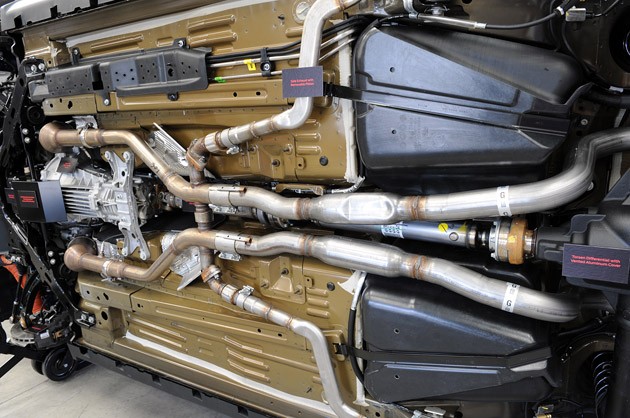
As if all that weren't enough, Ford also came up with what's called the TracKey. A secondary key that comes with the car, the TracKey can be activated by an authorized Ford Racing dealer (for a fee, of course) and changes more than 400 parameters of the Boss 302 through a dual-path PCM. Some of the most notable features include a lopey idle, a two-stage launch system, improved low-end torque, enhanced deceleration on track, and the deletion of the automatic skipshift.
You can see exactly how the launch control system works in the Short Cut video below.
For those customers who want an even more hardcore Boss 302, Ford will also be offering a limited number of Laguna Seca models. Available in two color combinations – black with red trim and silver with red trim – the Laguna Seca package comes with an aggressive aerodynamics package and more hardware for use at the racetrack. Most noticeable is the massive front splitter, which has to be installed post-title due to crash regulations, but the package also includes lightweight wheels, Pirelli R-compound tires, an air scoop on the transmission for additional cooling, an air duct kit for the front brakes, a dash-mounted gauge pack and a nifty looking cross brace that replaces the rear seats. The Recaro seats and Torsen differential also come standard.
So how does the 2012 Mustang Boss 302 drive? In a word: fantastic. With the high revving motor we weren't sure whether the Boss 302 could offer the same oomph as the standard GT at lower RPMs, but we needn't have worried. The torque curve feels as flat as Kansas, and the 5.0-liter V8 pulls hard from down low all the way up to its 7,500 rpm redline. In fact, it felt like the motor wanted to blast past the electronic barrier, with the power never falling off. Matched with 3.73 gears, the Boss 302 feels incredibly fast, closer to the GT500 than the Mustang GT in a straight line.
We weren't about to test the handling limits of the car on public roads, especially with track time later in the day, but the Boss 302 performed admirably on the street against everything we threw at it. The live axle only makes itself known on the bumpiest of corners, and the electronic steering provides excellent feedback. Ford had sent us out with the suspension set at 2 (with 1 being the softest and 5 being the stiffest), and we were surprised at how civil the car felt even over rough pavement. In fact, the entire car felt more docile than we expected. The exhaust note, while it sounded great, was even a little quieter than we expected. Ford has definitely designed the Boss 302 to be a car you could genuinely drive every day. The only issue we ran into was with the shifter, which occasionally refused to find the proper gear during softer gear changes. Whenever we were pushing the car hard, though, the shifter made its way with ease. Like many cars designed for the track, the Boss 302 simply functions better when driven hard.
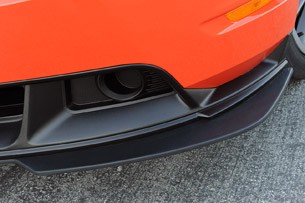
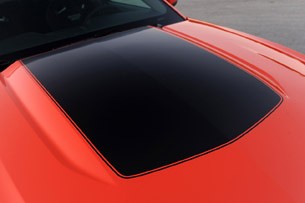
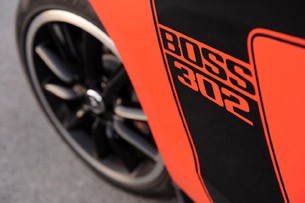
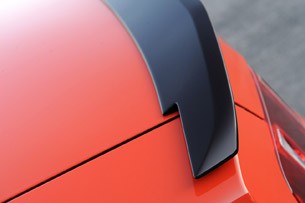
We didn't waste too much time on the street, though, with the promise of 2.24 miles of enclosed pavement waiting for us. Back at Laguna Seca, we hopped into another Boss 302 that had the TracKey in the ignition and the plate removed from the exhaust system. The difference was immediately noticeable from outside the coupe, with a much more aggressive, rumbling tone emanating from all four pipes. The difference was even more obvious while behind the wheel. In fact, the TracKey and the wide open exhaust completely change the Stang's character. With TracMode engaged, the Boss 302 becomes a snarling beast that's nothing like the relatively tame pony car we were in just a few minutes earlier. The 5.0-liter engine produces an ungodly sound at full throttle that sounds right at home at the racetrack and delightfully inappropriate for the street. If we had a Boss 302 in our garage, we'd run the exhaust wide open all the time and leave the standard key in the junk drawer. The sound and character of the car with the TracKey and the open exhaust is simply addicting.
Once out on track, we found the Boss 302 to have incredibly neutral handling. The front end simply goes where you point it with the rear following closely behind, making pinpointing apexes a breeze. This was most evident in the double apex of the Andretti Hairpin, where the Boss 302 never encountered even a hint of understeer. The Recaro seats work brilliantly at keeping occupants in place, and after just a few laps we were further convinced that they are a must-have option.
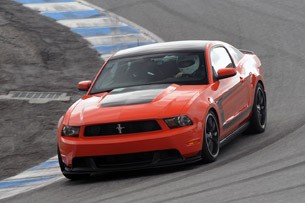
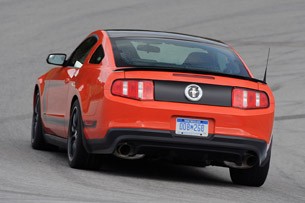
The availability of torque at any RPM was even more evident on track than on the street. We could drive nearly the entire course in third gear, with fourth gear required on the three main straights, and second gear only needed for the very slow turn 11. Ford says that the standard Boss 302 will lap Laguna Seca a second faster than the BMW M3 (the Laguna Seca package is one second faster still), and we're inclined to believe them. Ford actually brought an M3 for us to compare the two, but the Bimmer had some problems earlier in the day and we never got the chance.
The only weakness of the Boss 302 we encountered was with the brakes, mainly at the rear. The front Brembos were fine, but the 11.8-inch discs with single-piston calipers out back weren't up to the task of consistent hot-lapping. A few times the cars came in with smoke coming from the rear, and we couldn't do more than three or four really hard laps before they needed a cool down. Track addicts take note: new pads and maybe an aftermarket set of rear brakes should be on your shopping list.
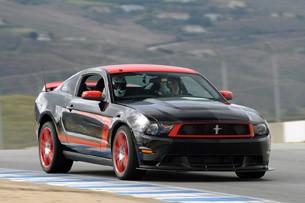
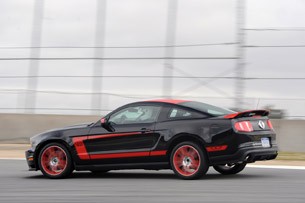
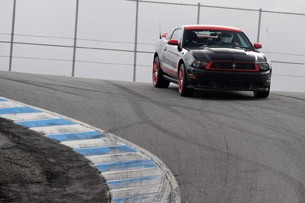
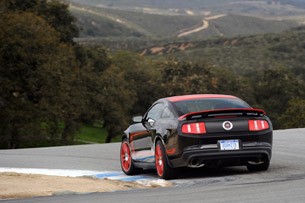
We managed a few laps in a Laguna Seca model as well, and while we weren't disappointed, we were hoping for a more noticeable difference between the two cars. We'll be the first to admit that we didn't push the cars as hard as some, and the differences are probably more noticeable for more seasoned weekend racers. Even so, the standard Boss is good enough that we would only recommend the Laguna Seca for the most hardcore racer.
Pricing has yet to be officially announced for both cars, but expect the standard Boss 302 to come in at just under $41,000 with the Laguna Seca package retailing for an additional $6,995. Both cars are a screaming good deal, but the regular Boss is such a phenomenal vehicle that we see it as the better value. Plus, you can always buy the front splitter and air ducts for the brakes from the Ford Racing catalog. The only thing we'd really miss from the Laguna Seca is that ultra-cool rear seat delete.
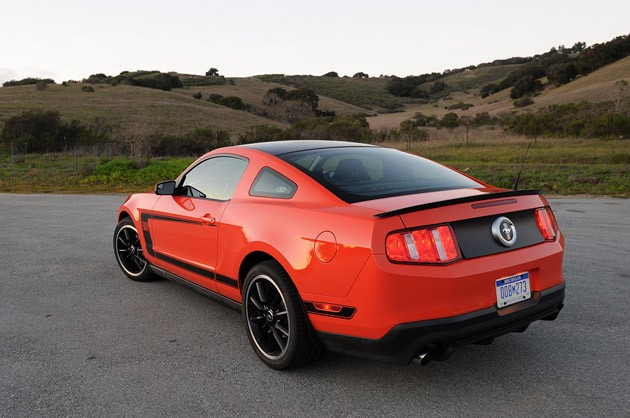
At the end of the day we had concluded one thing: The 2012 Ford Mustang Boss 302 is easily the coolest, most technologically advanced, highest performing Mustang ever produced by Ford. It's more than a fitting tribute to the original Boss 302, and will easily become one of the most desirable Mustangs of all time.
And here's where we make our plea for the customers who have already put down deposits and to those who will be lucky enough to own this car. Drive it. More than any other car we can think of, the Boss 302 deserves to be used and not stored away as an investment item to be sold at auction to overzealous bidders 40 years from now. Jim Farley stated it perfectly: "The Boss 302 is not a car that should be in someone's collection sitting there with seven miles on it. This car should be on YouTube doing something maybe even against the law because that's the spirit and the soul of this project. Every part of this car is about driving – the pure pleasure of driving at speed on the very limit of the driver's capability."
Photos copyright ©2011 Drew Phillips / AOL
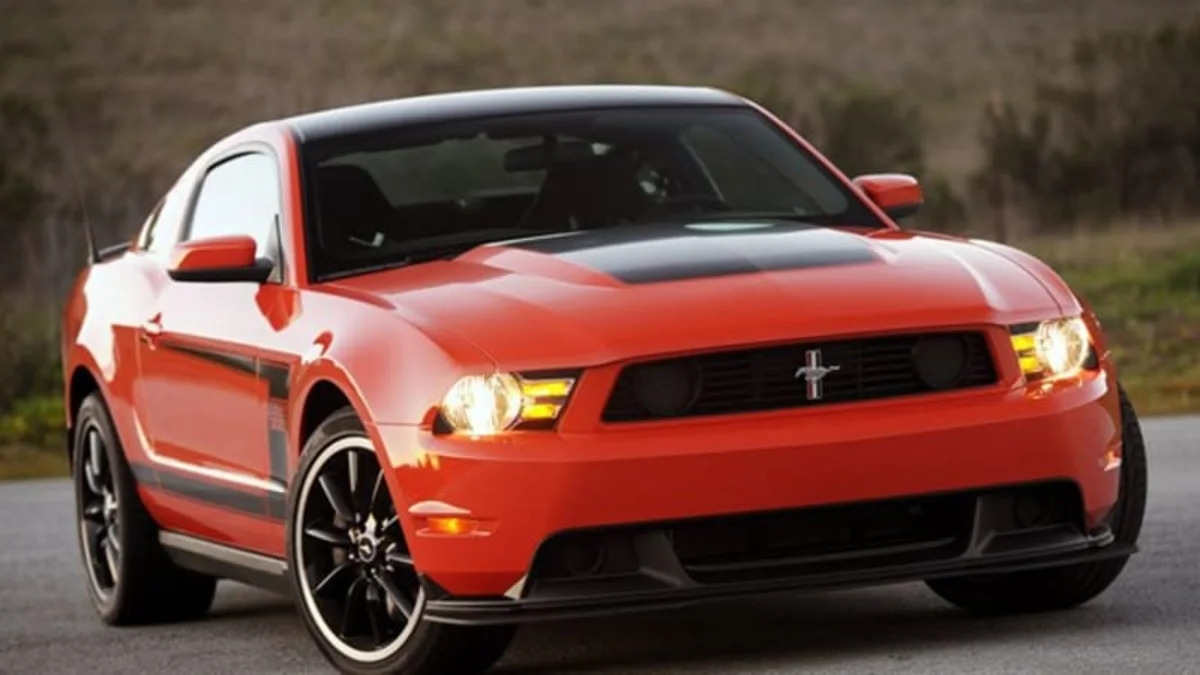
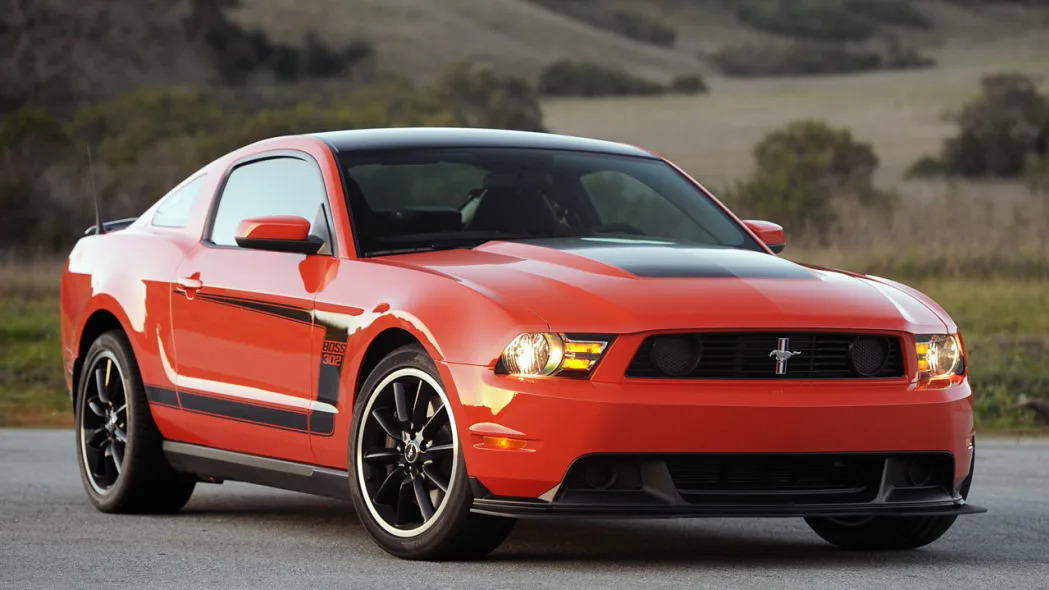
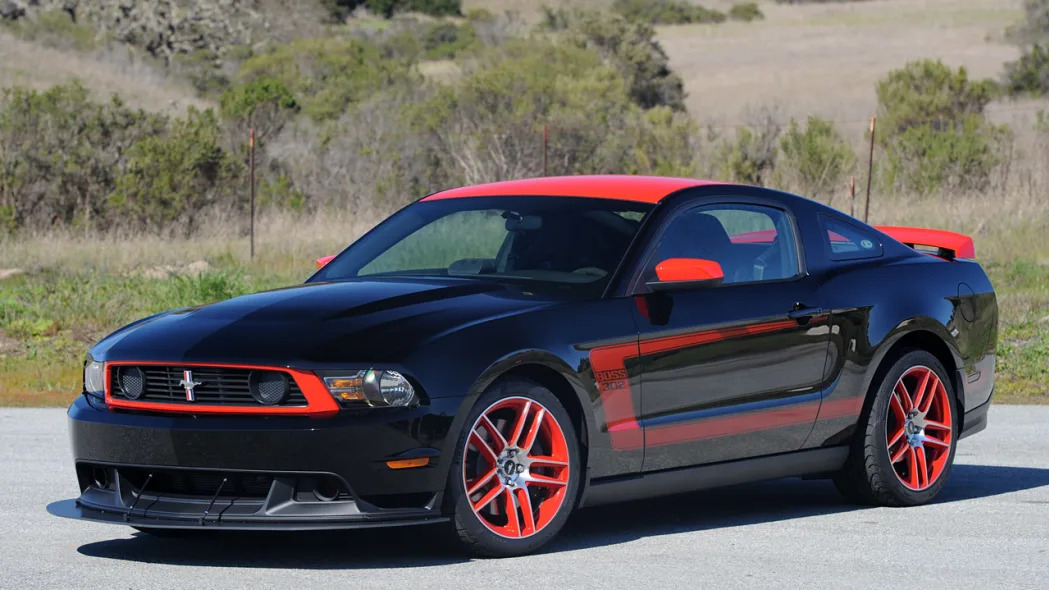
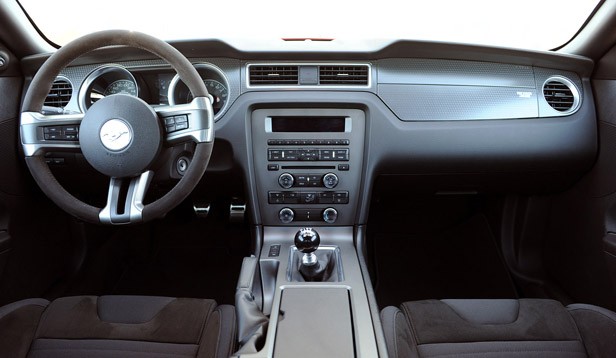
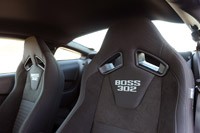
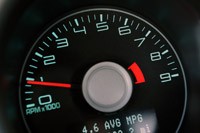
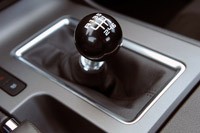
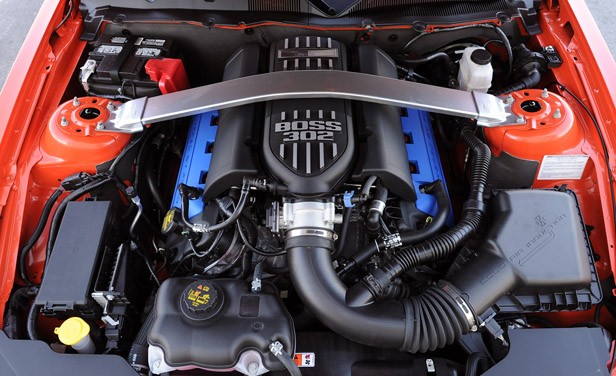
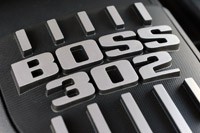
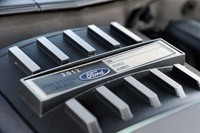
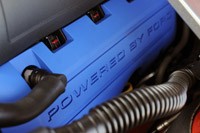
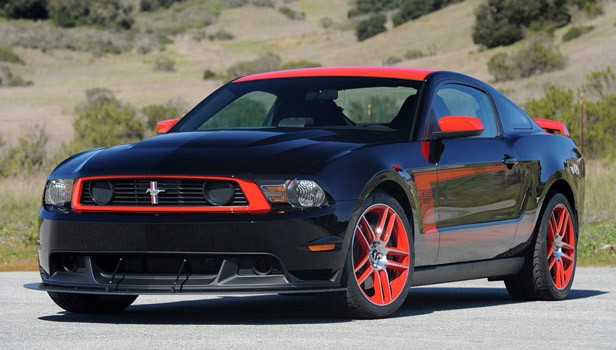
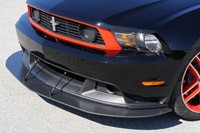
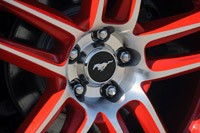
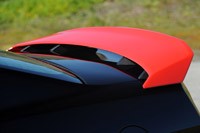

Sign in to post
Please sign in to leave a comment.
Continue